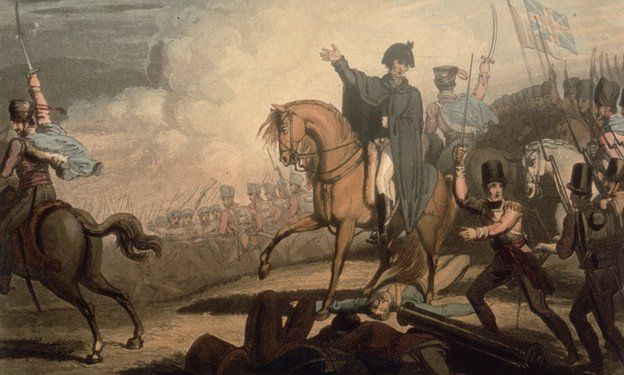Stiff upper lip: Your stories
- Published

Readers have been responding to a piece by Ian Hislop about whether the famous stiff upper lip is alive and well and Britain.
It is a phrase that expresses both emotional reserve and stoicism in the face of adversity. So how long have Britons been exhibiting the trait, and are they still at it?
Below is a selection of personal stories and historical anecdotes on the subject.
Readers' stories
Perhaps going to school at 09:00 after my mother died at midnight was a touch of stiff upper lip. I was 14 years old, and it never crossed my mind to stay at home. Keep calm and carry on was the rule at my house. Frances Worsley, Derbyshire
I had been waiting for a bus to arrive after my 20:00 lecture had finished, in the middle of December. I stood, shivering, wet, miserable, wondering why on earth I'd abandoned my Equatorial island for this rather less warm one. Near tears, wanting my mum. When I finally got home, still shivering, dripping, melting and miserable, the wind howling behind me, snow and rain pelting down, my room-mate came in right behind me. She shook herself off, grinned at me and said brightly, "A bit nippy out there, isn't it?" I had to laugh. Rhea, London
Years ago, my American girlfriend at the time, was driving us from London down to Cornwall. Not being familiar with a manual gearbox, it took her 20 miles to get out of second gear. She also had obvious problems with driving on the "wrong" side of the road. Eventually we came to a major roundabout. She was looking to the left for traffic. I could see a large 4x4 bearing down on us at some speed, a collision seemed imminent. However, it stopped less than 6in from her door and the driver indulged in the sort of hand signals that are not in the highway code. I nonchalantly informed her that "in this country, the traffic generally comes from the right." Then I lit a cigarette, and leaned back to see, with interest, how the rest of the journey went. We eventually got to Cornwall in one piece. Kevin Jones, Ambergate, Derbyshire
Some years ago flying a small helicopter in the Libyan desert we entered a sand storm. I became disorientated and crashed. The chopper was completely wrecked and broke in two. My passenger, a cavalry officer, and I were unhurt. As we surveyed the wreck, he turned and said: "I suppose you realise this is damned inconvenient." Andrew Spillane, Echourgnac France
I once played in a rugby match where a team-mate dislocated his shoulder. A few minutes later, another player went off with a knee injury. Unbelievably, as the chap with the knee injury was carried off, Paul stripped off his track suit one-handed and (still visibly in pain) ran back on. When I questioned what he was doing he theatrically slapped his head and his good shoulder declaring, "I've still got my head and one shoulder, so I can still tackle. I'm playing on." He did, and we won. It took two bouts of surgery to fix the damage he caused by his stiff upper lip. Matt Baty, Nantwich, UK
The stiff upper lip in history
Waterloo, 18 June 1815. Duke of Uxbridge (on being hit by a French cannonball): "By God, I've lost my leg." Duke of Wellington: "Have you, by God." Arthur Boland, Dublin, Ireland
I am reminded of the response of Londoners to the terrorist attacks in July 2005. Despite a large gathering in Trafalgar Square it seemed to me, living in the city at the time, that most people's response was to a grim determination to carry on and not to descend into an over-emotional outpouring of grief or anger - despite what many of us felt inside. Our stiff upper lip seems to be something that gives us strength as a society when we most need it. I think it is very much alive, albeit adapted to a more modern age. Stuart Colley, Brussels, Belgium
In the Korean War the Gloucester regiment was pinned down in an exposed position by North Korean/Chinese troops and fought with fanatical bravery until almost all were wiped out. Their commanding officer sought to alert US troops to their plight and garner reinforcements but described their situation as "a bit sticky" which the Americans interpreted as "uncomfortable but not too bad". Ian Prideaux, London
From the diary of Lady Florentia Sale, during the disastrous British retreat from Kabul in the First Afghan War: "Today we fought our way through the Jugdulluk Pass. Fortunately, I was only wounded once." Chris Cann, London
From a 90s cartoon about reactions to the three-minute warning (of a nuclear attack): The scene is a TV studio, the programme is Mastermind, the alarm has just sounded, the audience is fleeing in terror, the broadcaster - the late Magnus Magnusson - is saying "I've started, so I'll finish... " Terry Marsh, Thames Ditton, England